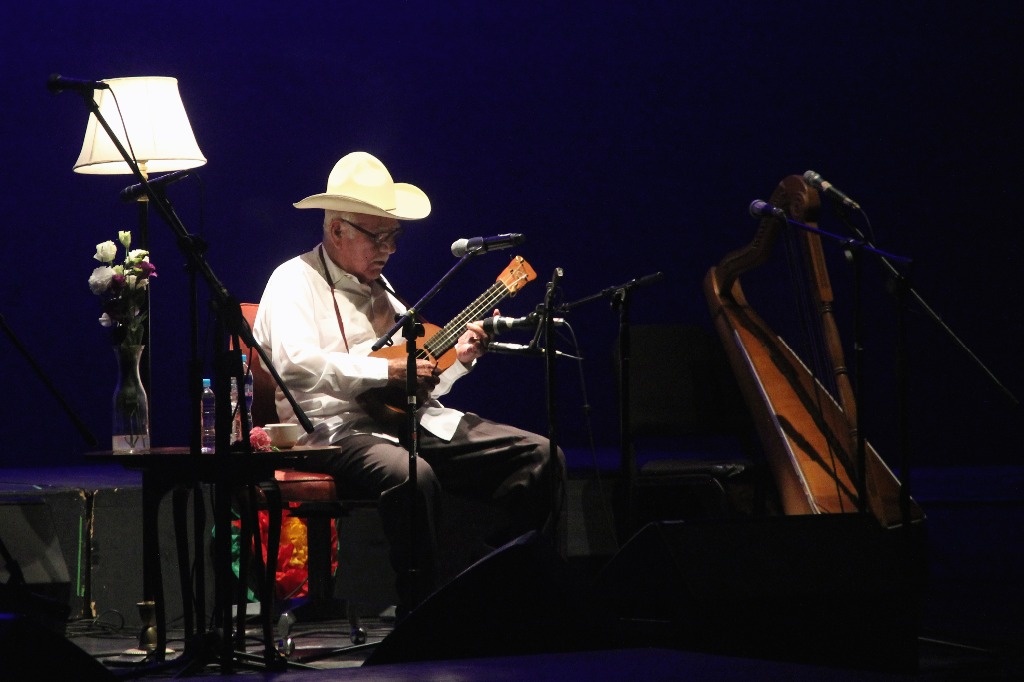Mexico City. At dawn this Thursday, May 9, Don Andrés Vega Delfín, considered one of the most important musicians in the world for keeping alive the great tradition of classical music from Veracruz, the son jarocho, died, at the age of 93, in front of to the landscape that adorns his home, in the Boca de San Miguel ranch, municipality of Tlacotalpan, Veracruz. The revels and verses immediately began to sound in his ranch, like this:
The fog leaves
when the dawn comes
Don Andrés Vega, with Esteban Utrera, completed a dynasty of great musicians whose number now exceeds one hundred, spread throughout the world.
In fact, the traditional son jarocho was on the verge of extinction when Andrés Vega began to revive that cultural legacy.
His children, his nephews, his grandchildren, his great-grandchildren, today are known in the world as Los Vega. It is a musical family like the Bach family was in Germany.
Los Vega, along with Los Utrera, were recognized with the National Prize for Sciences and Arts.
Don Andrés, his son Octavio, his wife Hermelinda and his grandchildren Raquel and Claudio, went to Los Pinos on November 27, 2012 to receive the award. In the ceremony, to which they were hurriedly summoned the night before, Felipe Calderón congratulated them for being the architects of what he called the new son jarocho
to which Don Andrés responded: New? Oh, I thought it was about 400 years old or more, it’s not that new.
.
In interview for The Day, Don Andrés Vega told reporter Mónica Mateos-Vega: A world without music would not be a world. There is a lot of joy, everything, but what always fascinated me was the peasant son jarocho. At a very young age I discovered the traditional son, that of the platforms. People would wake up at the fandango, and it would get dark and the fandango would begin again. We must not let the son jarocho die, we must continue to revive it, especially as it was before
.
Don Andrés, who has toured the country and the world as guitar player
of the Mono Blanco group, he was a farmer, mule driver, riverside fisherman and charcoal seller. He had almost no education, but he learned the son of the elders from him: “we have music spread in our blood. I didn’t teach any of my children to play, they did it out of excitement and it didn’t even cost them any work. When I was a kid that’s how I started. A friend of my father, walking through the countryside, found the remains of a horse and thought: ‘I’m going to take the jaw to Mario’s son so he can play it as a güiro’, and that was my first rehearsal. Then I ascended to the party, and it didn’t cost me any work: quickly, quickly I learned. All my children were the same, they already had music in their heads.”
It was in the 1980s when fandango resurfaced in the first stage, thanks to Don Esteban Utrera and Don Andrés Vega, whose notable artistic career led to the creation of the Andrés Vega Delfín medal in 2007 by the government of Veracruz, which It is awarded annually to the best traditional musicians in the region, at the La Candelaria festival, in Tlacotalpan.
Don Andrés’ children now head the family tree: Octavio with the Mono Blanco group; Tereso with the group Son de Madera; the grandchildren like Los Vega; a granddaughter, Raquel, in the Caña Dulce group, Caña Brava; Martha, daughter of Don Andrés, is the best fandango dancer today.
On Saturday, October 6, 2018, Don Andrés and his family moved the fandango to the Teatro de la Ciudad, in the Mexican capital, for three and a half hours.
At one point during that fandango, Tereso Vega, that jarocho Stevie Ray Vaughan, couldn’t get his voice out of emotion, tears came from between his eyelids and he apologized in two ways. The first: forgive the tears, but they are emotional
; the second: he emitted songs with the power of a cyclops, the voice of a hoarse volcano and he strummed his revel like a minotaur in his labyrinth and then he entered into a dialogue of philosophers with Ramón Gutiérrez, whose sonic guitar made the planets spin in the middle of the stalls that were delirious with joy .
Don Andrés Vega, sitting in his armchair, played his son guitar in a masterful disquisition that is recorded on the compact disc titled Laguna prieta Vol. 1, published by the independent record label Los Vega. That music has been shamelessly considered by experts as the Jarocha version of The well-tempered harpsichord of Bach, not to compare two incomparable musicians, but simply because the music of both produces similar sensations, serene moods, joy and wonder. Both Bach and Vega provide joy, joy, health and peace of mind and soul to those who listen.
At dawn this Thursday, May 9, the landscape of the Boca de San Miguel ranch, in Veracruz, saw the fog leave when dawn came in and then became like this:
the sky on the horizon
It’s lit like a bonfire.
#Don #Andrés #Vega #guardian #son #jarocho #died #age
– 2024-05-11 18:17:39
